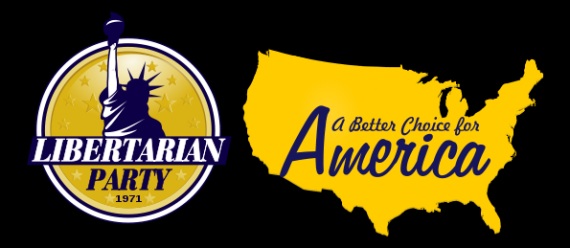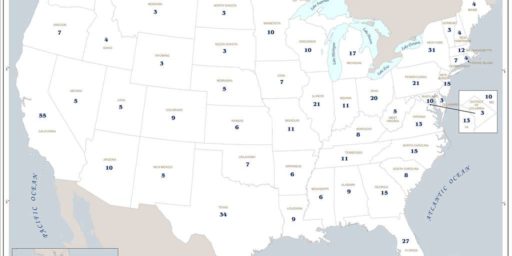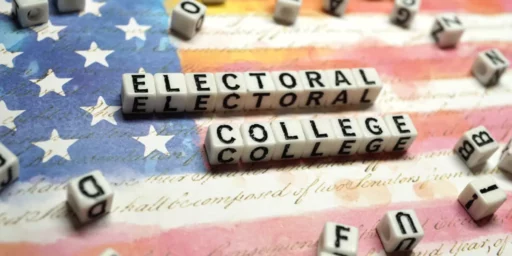Third Party Fantasies
On this morning’s Diane Rehm Show, a caller asserted his preference for a new third party and one of the guests cited the cost associated with creating such a party. This is an ongoing lament in US politics, especially in times of heightened frustration with the political class (such as back in 1992 and the Perot movement). While there is little doubt that there are cost (and legal) barriers to the creation of a third party, they are not the major barriers to a third (or fourth, etc.) party in the United States.
The main barrier is math.
Or, more accurately, the electoral system we use to elect members of legislative bodies in the United States, i.e., we use single member districts with plurality winners (also know as first past the post or FPTP). More directly: each seat is individually contested and the candidate with the most votes wins and as the number of viable candidates compete for those votes the most dispersed the votes become. As such, the most likely winner is the party/candidate that is the largest. The incentive to be a competitive, but losing, third party is small.
 A recent example well illustrates the principle: the special election in Hawaii (see the numbers to the right). There we had the equivalent of a multi-party contest for a single seat in a single member district with a plurality winner. There can be little doubt that the majority of the voters had a preference other than the winner (who was first past the post, so to speak). Basically, the introduction of three competitive candidates meant that, by definition, the winner would likely win with less than majority support. It is also a situation in which over the long haul the clear strategic choice for the Hanabusa “party” and the Case “party” would be to work together next time so as to capture the ~58% that they appear to represent. Indeed, that basic point is that this is why we have two parties and not three or more: the incentives are for parties to be as inclusive as possible so as to maximize their vote. This incentive structure is clearly a major reason we have a two party system and this dynamic even has a name in political science: Duverger’s Law: “Plurality rule tends to reduce the number of parties to two, regardless of the number of issue dimensions” (Taageperga and Shugart 1989:65).
A recent example well illustrates the principle: the special election in Hawaii (see the numbers to the right). There we had the equivalent of a multi-party contest for a single seat in a single member district with a plurality winner. There can be little doubt that the majority of the voters had a preference other than the winner (who was first past the post, so to speak). Basically, the introduction of three competitive candidates meant that, by definition, the winner would likely win with less than majority support. It is also a situation in which over the long haul the clear strategic choice for the Hanabusa “party” and the Case “party” would be to work together next time so as to capture the ~58% that they appear to represent. Indeed, that basic point is that this is why we have two parties and not three or more: the incentives are for parties to be as inclusive as possible so as to maximize their vote. This incentive structure is clearly a major reason we have a two party system and this dynamic even has a name in political science: Duverger’s Law: “Plurality rule tends to reduce the number of parties to two, regardless of the number of issue dimensions” (Taageperga and Shugart 1989:65).
Indeed, if what one really wants is multi-party competition, then one needs to promote serious electoral reform that would move the system in a more proportional representation direction that would more broadly represent the more specific interests of the public, whether than be the Tea Party, the Libertarians, the Greens or whomever.
As I noted in an earlier post, my predilection at the moment is to a mixed-member system, such as the one used in Germany and elsewhere that elects half the legislature in single-member districts and half via proportional representation.
A parting comment on this topic: when one mixes a serious third party with FPTP, one gets the UK where a third party can get almost as many votes nationally at the larger parties, but still get the shaft, seat-wise.
References
Taagepera, Rein, and Matthew Søberg Shugart. 1989. Seats and Votes: The Effects and Determinants of Electoral Systems. New Haven, Conn.: Yale University Press.







All true and I say that as one who, for many years, fervently believed in the need for a third party. Now I see the problem a bit differently – the current parties are so completely entrenched that there is probably no real opportunity for one of them to go the way of the Whigs. In other words, we may not need a third party, but we could probably stand to replace the two we’ve got.
There is no perfect system. However I believe we can improve ours by having a primary and alternate choice on a ballet. If no one gets 50% +1 , take the top two vote getters and count the primary vote and if the primary vote isn’t in the top two then count the alternate vote if it is for one of the top two. I would be open to slight variations of this but would be against something too complicated.
Great post Steve, and a nice way to highlight was is actually one of few real findings of political science.
There is a caveat, which is that the exception to this rule occurs in regional parties, where, in essence, you can have more than 2 parties, but only 2 are competitive in any one place. In many urban areas, you could easily see the rise of two parties carved out of the Democratic vote, and similarly in many parts of the South, you could easily see two coming out of Republican votes. And indeed, you DO see that in the sense that a Republican in NYC is not the same thing as one in Alabama.
So there is an issue where the institutional power of the parties — money, media access, institutionalization of primaries, etc. — creates artificial hurdles to party formation. Yes, of course, you would still have the national elections creating Duverger-style pressures, but the answer to that is simple — the regional minor parties could simply decline to run national candidates and instead throw endorsements to one of the two major parties, and indeed, the “major” parties could make that an option by reforming primary voting and caucuses to allow allied parties open access. But the reality is that national parties have no interest in allowing anything that would make it easier for regional parties to form.
Why ditch our two-party plurality paradigm? I really don’t know that having two parties alternate in shabby governing is any worse than having more parties form shabby government coalitions.
I’m with Capital L. People often overlook the advantages of a two-party system. At least then, you know what coalition you are voting for. Otherwise, you don’t know what coalition the parties you are choosing between are going to vote for. Many LDP voters would rather the Tories not be given the reins in Parliament. As it stands, you know if you are voting for the party that promises to lower taxes you are also voting for the party that is generally Pro-Life, skeptical of environmental regulation, and so on. Vote for the Low Tax Party and you don’t know who they will align themselves with in a coalition.
Another factor more peculiar to our electoral system is that while you can have three parties in congress, you can only have one in the presidency. That means that even then, you’re going to likely be torn between two parties so as not to give the party you dislike most a plurality. Multi-party systems are more built for a parliamentary system of governance.
Or perhaps the two could cancel one another out. The race for the presidency could result in parties announcing their coalitions beforehand. You could get multiple parties nominating the same presidential candidate as happens in states like New York and the parties’ congressional candidates agreeing, more-or-less, to coalition with the parties in congress that they coalition with for the presidency.
But the U.S. really only has a 1 and 1/2 party system. There are 100’s of elections that the Republicans have zero chance of winning while the Democrats have fewer elections where they have no chance of winning.
As the demographics of the U.S. change, the Republicans have zero chance of remaining a viable political party. The number of offices that the Republicans can possibly win will keep going down and the number of elections that are a lock for the Democrats will keep goingup.
The real, long term question for politics and governance in the U.S. is what happens when the Republican Party is no longer viable. Will all of the current Republican voters start voting in the Democratic Party primary so that the conservatives will have some affect on politics or will people find alternate method of dealing with governance when voting no longer affects the government.
I’d like to see party references removed from the ballot, to include straight ticket voting. Can you imagine the confusion and chaos?
Duverger’s Law states that SMDP will tend to create a two party system in a given district. It does not state that the people of the United States must forever be subjugated by the reactionary corporatist policies of the Democratic and Republican parties. it is perfectly reasonable, on the basis of Duverger and FPTP, to work to create a quilt work of two party systems in different states across the country: for instance, between Dems and Greens in liberal states, between Republicans and Libertarians, say, in more conservative ones. The major opposition to this are the ruling parties and the entrenched political class, who do not want this to happen.
Freedom and independence today begins with freedom and independence from the tyranny of the ruling two party state.
until there is serious campaign finance reform complete with the abandonment of the moronic and wholly unsupported by the constitution notion that money = speech it won’t mater how many parties there are .. policy will be made by those who finance the campaigns as it is right now. The illusion of a democratic system is implicit in all of the reform ideas and it is, at best, chuckle worthy.
The current system does not create two parties. Out of the 435 house seats, maybe 50 are capable of electing either a Republicans or a Democrat. There are 30 districts where the Republicans do not run anyone against the Democrats and there are about 100 to 150 seats where the Republicans run only a token opponents.
The idea that money causes the problem and that fundraising is important defies the fact that most races are not really contested and that few district are 50-50 districts where money matter the most.
Does anyone believe that Bob Dole or John McCain would have won if they would have had more money?
The talk of election rules or money just masks the fact that most people automatically vote for the Democrats or the Republicans and that elections are at the margin with few close elections.
The long term problem in the U.S. is what will happen when more than 50% of the voters automatically vote for the Democratic candidate?
As with democracy generally, a two-party system is awful — except when compared to all of the alternatives.
Superdestroyer,
As nature abhors a vacuum, a political system built for two parties abhors the existence of only one. There are circumstances in which one party or the other cannot make any traction, but on a national level there is a reason that any time one party becomes too dominant a counter-party eventually forms. There is simply no tent big enough for everybody.
Once the Democrats don’t have Republicans to worry about (if it occurs as you suspect), they will formally split at some point or another. There’s no reason for the groups that can’t seem to get a hearing within the primary not to take advantage of the fact that there is another election that occurs afterward.
What keeps the Democrats united now is that they (believe they) have the Republicans to worry about.
Chicago has been a one party state for 50 years. The same can be said for Baltimore, Detroit, and many other large cities. The one party voting habits of blacks, Hispanics, Jews, gays, and government workers will make it impossible for another party to be viable.
A green party to the left of the current Democratic Party will be just as white and the current Republican Party. Most blacks have only voted for Democrats in their entire lives. Do you really think that a green party will develop that can appeal to them.
Look at current politics. Anything that is conservative is immediately defined as racism. Even enforcing current immigration laws is considered racist. Do you really think that two political parties can exist when any deviation of current Democratic party supported positions is considered racist?
I’m always appreciative of citations, but 20+ years later, what Taagepera and Shugart say looks increasingly dated.
The number of parties in most first-past-the-post (FPTP a.k.a. plurality) contests in major democracies (UK, Canada, India, etc.) looks a lot more like the votes distribution in the Hawaii by-election than it looks like most US elections. And the number of parties is rising in most FPTP jurisdictions outside the US.
Having only two parties in the US is seriously below what it “should be” even allowing for the undersized House (a factor Taagepera explicitly incorporates into the models in his 2007 book and which would predict more than 2 parties for most FPTP systems), or presidentialism (which I have shown in various of my works tends to reduce the number of parties). One would think that federalism would increase the number of parties, if it has any effect at all.
So why does the US have as close to “pure” two-party system as anywhere? It really is a puzzle, and it can’t be pinned on the use of plurality elections. Some of it is the primary system (which is suspended in a case like the recent Hawaii election) and some of it is our discriminatory campaign finance laws. But it really is a classic case of “over-determination.”
Matthew
The rules of governance make as few as parties as possible. Since all of the chairmen of the U.S. House and Senate are based upon having senior in the majority party. A third party that has no chance of ever being in the majority gets no real support. Why would anyone want to be involved in a third party that has no chance of ever being in the majority and never having any real effect on policy.
The main reason that Democrats control some areas of the country and Republican control other areas is that it’s impossible for the opposing party to gain traction when the national party is hanging around their neck. The Republican Party of Cook County is incapable of adapting enough to get elected because they are linked to a national party. Ditto for the Democratic Party of Utah. This is not a problem on the national level. The losing party has the freedom to adapt into something that current members of the majority party would be willing to vote for when the majority party screws up too much or demonstrates a complete disregard for their perspective one too many times.
Trumwell,
There is no way that the Republicans can “adapt” enough to be able to appeal to blacks and Hispanics while remaining conservative in any form.
A Republican Party that could appeal to blacks and Hispanics would be so close to the Democratic Party as to be indistinguishable.
The real question is how can the Repubilcans “adapt” enough to appeal to blacks and Hispanics without alienating its base. If you look at the massive failure of the Bush Administration, the Republicans cannot. The Bush Administration tried to move to the left to pander to Hispanics and only succeeded in alienating middle class whites instead.
<i>There is no way that the Republicans can “adapt” enough to be able to appeal to blacks and Hispanics while remaining conservative in any form. </i>
There’s no rule that says the Republican Party has to be conservative. Right now they are (partially) conservative because that wins them enough elections for it to be worthwhile. If that ceases to be the case, they will be something else. They may call it conservative or they may not and it may or may not be at all recognizable to what we call “conservative” today.
The main reason that parties exist is not to adhere or represent a political philosophy so much as it is to win elections. That’s why parties outlast the ideologies that they run on.
<i>A Republican Party that could appeal to blacks and Hispanics would be so close to the Democratic Party as to be indistinguishable.</i>
Unless the exodus of moderate liberals to a more liberal Republican Party causes the Democratic Party to move further to the left. The Republican Party may become something that looks very much like the Democratic Party does right now. The Democratic Party could then look like the Liberal Party of Canada.
Or it will simply be cut along different lines. One party may be the corporate liberal party while the other is the populist liberal party. The Social Liberal Party versus the Economic Liberal Party. The Evan Bayh Party versus the Barbara Boxer Party. It could cut 100 different ways.
But without a relevant Republican Party, it will cut. Things now perceived as small differences within the party will become perceived as large differences. Differences worth splitting over. That split may or may not involve people leaving for a party known as the Republican Party (I suspect it would) or it may involve the creation of a new party (if the GOP fails to adapt). But it would not involve everybody shrugging and foregoing an opportunity to win in November what they couldn’t win in June. People are fractious.
Regarding Bush, the administration tried moving to the left on immigration (as well as spending), but the party didn’t. They were never on board. They never saw the necessity. Indeed, at that time (with the GOP controlling both houses and the presidency) it was not necessary. They believe that the existing coalition worked. Once that is disproven, what remains of the party has a choice. Either they want to win elections or they want to stay true to their values even if that means never winning. In the long run, parties almost never choose the latter. If they do, however, that’s when some faction of the Democratic Party takes a look around and says that they think that they can build a better coalition outside of the primaries than they can within the primaries and bolts. At that point, all they have to do is beat the Republican Party and they are the new second party without the baggage or stubbornness of the GOP. I think that’s less likely than the first scenario, but far more likely than a scenario which involves everybody voting in the Democratic Primary because nationally there is no other relevant party.
They did not see it as being politically advantageous (and they were, at least in the short term and maybe in the longer term, right). They believed (and believe) that they can win without going liberal and so they fought it
Congress and party activists believed (and believe) that conservatism wins elections. Given that at the time they had the presidency and both houses of congress, it was not an unreasonable belief. If the day comes that without Hispanic votes or more liberal and moderate votes they cannot win elections and this is demonstrated over and over again by GOP losses, you’re likely to see conservatives reassessing the situation. Deciding that some things are like the Department of Education. You don’t like it, but you can’t fight it.
Trumwill,
You may want to look at the politics of New England. The Republican Parties in those states moved to the left to attract more moderate votes. However, the Democrats did not feel to move to the left at all. The New England Republicans failed to attract any of the “moderates” that supposedly reside in the Democratic Party but alienate their own case and failed to win any elections. Now the Republicans in New England are on life-support and are still incompetent and failing.
David AXelrod is so far ahead of your thinking that it should be embarrassing. David Axelrod knows that the way to keep enough demographic groups wedded to the Democratic Party is to get them addicted to government spending. Thus the push to “tax the rich” which every conservative should read as “tax whites” and spend the money on entitlements for core Democratic groups. That is the way that it is done in “Chicago and will soon be done in the U.S.
The idea that two political parties can support massive entitlement spending. open borders but make abortion or gays the main issue is laughable and naive.
The U.S does not need two big spending, big government nanny state parties. One party fits the need nicely. AS the number of voters that supports big spending, big government, nanny state policies goes past 60%, the the other 40$ of the voters are faced with the issue of trying to support an irrelevant second party or move into the relevant party and trying to make changes at the primary level.
Look at how moderates and conservatives managed to vote Cynthia McKinney at of office twice by voting in the Democratic Primary in Georgia. That is a taste of what politics will look like in the future. Putting together coalitions to affect primary elections instead of running candidates in a second party that has zero chance of winning.
The Republican Parties of New England are too closely associated with the Republican Parties of Alabama and Texas. Even if they move left, the perception will be that they still belong to the conservative, scary Christian, anti-government party. In that case, the Democrats don’t have to move further to the left. They merely have to say “They’re members of the conservative party” and show pictures of the candidates shaking hands with George W. Bush or something. Or, in the case of congressional elections, simply point out that there most important vote will be for a Republican Speaker of the House. Probably a Republican from a more conservative place with scarier ideas (queue music).
Axelrod’s plan only works if there is a party running against bigger government. Otherwise, it stops working.
Honestly, I find the notion that people vote based entirely on spending to be far overly simplistic. If that was the case, Idaho and Utah would be Democratic states. Social and cultural issues are important. It’s why rich white people vote to tax themselves and why poor white people vote for people that vote against government programs that would benefit them.
For instance, without the threat of a Republican Party, you’re going to start seeing a lot more black politicians come out against immigration. Right now more Hispanics means more Democrats and the unity involved is important in fending off the Republican Party. No Republican Party, no unity.
I can see a future where the Republican Party becomes like the Whigs where they lose except when they strumble across a popular candidate. Or perhaps like the Republicans during the New Deal where the same thing occurred. But in both cases, that situation did not last indefinitely. Eventually the Republicans found and exploited a hole in the New Deal coalition. The Whigs were replaced by a party that found an issue (or issues) that they could win on.
History is full of periods where it looked like some party had an insurmountable advantage. Never has it lasted indefinitely. George W. Bush may well have destroyed the Republican Party. Or maybe demographics are destroying the Republican coalition permanently. But neither of these two things are changing the mathematics of constitutional design.